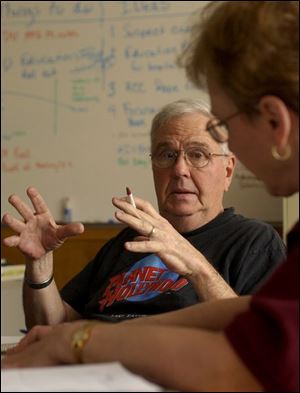
Vigil helps families cope with murder of loved one
4/11/2005
Russ Simpson, left, who created the local chapter of Parents of Murdered Children, discusses with Carol Plenzler plans for the vigil on Wednesday. The vigil is being held in conjunction with National Victims' Rights Week.
Larry Adams can't remember the exact date that his teenage daughter went missing or whether she had celebrated her 14th birthday at the time.
But he can recount with amazing detail how there was just a dusting of snow on the ground the day a rabbit hunter in a Michigan field found Eileen's body wrapped in an old rug and bound with cord.
Mr. Adams suffered through the kidnap and murder of his daughter in 1967 - before police crises counselors were ready to assist, before organizations such as Parents of Murdered Children existed, and before annual candlelight vigils were organized to help guide victims and their survivors through their grief.
Mr. Adams, 79, doesn't believe his agony would have been any less intense had he experienced the loss of his daughter today.
However, the insanity of the grief might have made more sense if he had been surrounded by others who felt his kind of pain.
"It was a very, very tough situation. None of us ever really got over it. I would suppose that people would say that I, in particular, never got over it," said Mr. Adams, a charter member of the local chapter of Parents of Murdered Children. "And there was nothing to help us through it, absolutely nothing."
Things have changed. Today, advocacy organizations exist to support victims and to prepare them for what lies ahead. Laws are in place to protect a victim's rights.
Grief counselors are trained and ready to respond. Hospitals have private rooms where victims of sexual assault can be treated with dignity.
But advocates say there is still more to do.
The changes in victim rights over the past two decades is the focus of the speakers at Wednesday's candlelight vigil at St. Clement's Catholic Church, 3030 Tremainsville Rd.
Held during National Victims' Rights Week, the annual event brings together victims, their families, their supporters, and, organizers hope, community members.
The vigil is being organized by members of Parents of Murdered Children, Mothers Against Drunk Driving, Bethany House, YWCA Battered Women's Shelter, and the YWCA Rape Crisis Center.
Pam VanCamp, director of the YWCA Rape Crisis Center and one of the original organizers of the vigil, said many people mistakenly believe that police departments have always had special victim units to handle rape cases and that trained counselors are with victims during police interviews.
That's just not the case, she said.
"They think these rights come out of noplace. In fact, people like our group have fought for them," she said. "We have always said we don't want more rights, we just want equal rights with the offender."
Victims and their families began organizing about 30 years ago. Parents of Murdered Children was founded by Charlotte and Robert Hullinger in 1978 after their daughter was killed by her ex-boyfriend. Mothers Against Drunk Driving was co-founded in 1980 by Candy Lightner, whose daughter was killed, and by Cindi Lamb, whose infant daughter was rendered a quadriplegic, both by repeat-offender drunken drivers.
In 1980, President Ronald Reagan initiated the national observance to recognize and honor victims and survivors of crime, calling it National Crime Victims' Rights Week. Twenty-five years later, the Toledo vigil will include a listing of area victims and a place to write messages, which will be brought back each year to create a wall of remembrance.
Russ Simpson, who created the local chapter of Parents of Murdered Children, said he too will speak about the changes in victims' rights. Mr. Simpson, who suffered through the loss of two murdered children - his 4-year-old daughter in 1969 and his 19-year-old son in 1981 - speaks whenever he can to groups of students and even inmates, two programs that did not exist 20 years ago.
Carol Plenzler of Mothers Against Drunk Driving, who lost her sister to a drunken driver in 1998, said organizations work hard on behalf of the victims because often the victims themselves aren't able to. With national statistics showing that people age 12 and older experienced an estimated 24.2 million violent and property victimizations in 2003, organizations have countless people to reach.
Mr. Adams said that for years, he has found solace in meeting with families that have experienced the horrors of a murdered loved one. And he has found comfort during the one week each year that victims and survivors across the country are honored.
But that doesn't mean the pain ever goes away.
"I'm looking at her picture right now, I can't for the life of me remember what her birthday is," he said. "If I ever give a talk again, one of the things I'd have to address is why you have to forget things. It's just too hard too live with the memories."
Contact Erica Blake at: eblake@theblade.com or 419-724-6076.